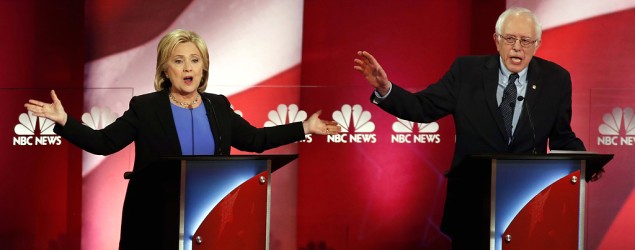
If for some strange reason you didn’t have a chance to watch the Democratic debate Sunday night — holiday weekend, anyone? — but if you still want to know how the party’s two major contenders, Hillary Clinton and Bernie Sanders, will be trying to close the deal with voters in Iowa and New Hampshire in the coming weeks, one moment in particular summed it up: their heated back-and-forth over health care.
A little background first.
In recent days, multiple polls — in Iowa, New Hampshire and nationally — have shown that Sanders, once the longest of long shots, is either gaining ground on Clinton or, in the case of the Granite State, pulling farther ahead.
In response, the formerly restrained Clinton campaign has finally started to go after the Vermont senator — on guns, in part, but also for his longtime support of a single-payer, Medicare-for-all health insurance system. (Sanders released a specific plan hours before the debate.)
Before Sunday, Clinton’s health care attack appeared to be backfiring. “Even though its real-world prospects are pretty close to nil, [single-payer] is still iconic in the eyes of a large proportion of the Democratic left,” John McDonough, a former Senate staffer who helped draft the Affordable Care Act, told Politico. “A lot of people will interpret this attack in a way that may be even more hostile to Clinton.”
But on stage in Charleston, S.C, the former secretary of state pivoted to a more positive vision, and the maneuver served her well. She stopped accusing Sanders of wanting to raise taxes on middle-class Americans to pay for his plan, and she didn’t repeat the debunked claim by her daughter, Chelsea, that Sanders would “empower Republican governors to take away… health insurance for low-income and middle-income working Americans.“
Instead, Clinton laid out why she believes pursuing single-payer health insurance at this point wouldn’t work — while maintaining that she “respect[s] Sen. Sanders’ intentions.”
“The Democratic Party and the United States worked since Harry Truman to get the Affordable Care Act passed,” Clinton said. “We finally have a path to universal health care. We’ve accomplished so much already. I do not want to see the Republicans repeal it, and I don’t want to see us start over again with a contentious debate. I want us to defend and build on the Affordable Care Act and improve it.”
Sanders, of course, fought back. He name-checked Franklin Delano Roosevelt and Harry Truman, who “believed that health care should be available to all of our people,” as he put it. He expressed hope that America could follow in the footsteps of Europe and our neighbors to the north, questioning “why we are spending almost three times more than the British” as well as “50 percent more than the French [and] more than the Canadians” on health care. And he promised that while “we’re not going to tear up the Affordable Care Act… we are going to move on top of that to a Medicare-for-all system.”
But Clinton wasn’t swayed. With Republicans “just vot[ing] last week to repeal the Affordable Care Act,” starting “a whole new debate” over government-run health insurance would “set us back,” she insisted — and she delivered a history lesson to prove her point.
“Even during the Affordable Care Act debate, there was an opportunity to vote for what was called the public option — in other words, people could buy into Medicare,” Clinton said. “And even when the Democrats were in charge of the Congress, we couldn’t get the votes for that.”
“So what I’m saying is really simple,” Clinton concluded. “This has been the fight of the Democratic Party for decades. We have the Affordable Care Act. Let’s make it work.”
By returning again and again to the theme of what works — and what doesn’t — Clinton positioned herself as the chief pragmatist in the race: the one who’s been there, done that, and isn’t going to waste precious time daydreaming about pie-in-the-sky proposals that don’t stand a chance of passing Congress. It was, and always will be, a much better fit for her than “enemy of single-payer health care” — but it isn’t exactly the most rousing of closing arguments, especially for primary voters looking to be inspired.
Sanders, on the other hand, didn’t retreat from his embrace of a health care model that Democrats couldn’t enact even when they controlled the presidency and both houses of Congress (which isn’t likely to be the case in 2017). In the process, he reaffirmed his unwillingness to compromise on his ideals, which is what his supporters love most about him.
Both candidates played to their strengths Sunday night. The question now is which vision of politics Democratic primary voters will prefer when they finally go to the polls next month: politics as it is, or politics as you want it to be.
No comments:
Post a Comment